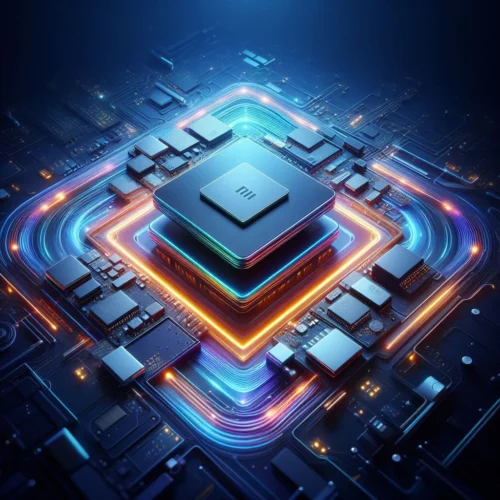Xiaomi is pushing the boundaries of smartphone technology by Xiaomi’s Self-Developed Chips to power Flagship Devices. The tech giant is gearing up to launch its own chips for various aspects of its devices, such as imaging, communication, battery, and charging management. This is a major step for Xiaomi, as it aims to improve the performance and capabilities of its next flagship device through Xiaomi’s Self-Developed Chips . By developing its own chips, Xiaomi can optimize its hardware and software integration, and offer a more seamless and efficient user experience.
Xiaomi’s Self-Developed Chips for imaging Excellence:
Xiaomi is entering the field of self-designed imaging chips, which will revolutionize smartphone photography. The company has a strong background in camera technology, and its chips will provide advanced features such as better low-light performance, improved image stabilization, and more accurate color reproduction. The chips will also integrate artificial intelligence (AI) to enable smarter and more intuitive camera functions, allowing users to create stunning photos with ease.
Revolutionizing Communication:
The Xiaomi’s Self-Developed communication chip is another key area where Xiaomi aims to assert its dominance. By creating an in-house solution, the company seeks to optimize network connectivity, reduce latency, and enhance overall communication capabilities. This move aligns with Xiaomi’s commitment to providing users with a seamless and uninterrupted smartphone experience, especially in an era where fast and reliable connectivity is non-negotiable.
Battery Efficiency and Management:
Xiaomi’s venture into self-developed battery management chips signifies a strategic move towards achieving optimal
 power efficiency. With smartphones becoming increasingly powerful and feature-rich, managing battery consumption has become a critical aspect of device design. Xiaomi’s proprietary battery management chip is expected to employ advanced algorithms and adaptive technologies, ensuring prolonged battery life and intelligent power distribution for various applications.
power efficiency. With smartphones becoming increasingly powerful and feature-rich, managing battery consumption has become a critical aspect of device design. Xiaomi’s proprietary battery management chip is expected to employ advanced algorithms and adaptive technologies, ensuring prolonged battery life and intelligent power distribution for various applications.
Swift and Smart Charging:
In the realm of charging management, Xiaomi is set to introduce groundbreaking technologies to complement its self-developed battery management chip. With a focus on rapid and intelligent charging, users can expect quicker charge times without compromising battery health. Xiaomi’s commitment to user convenience is evident in their efforts to create a charging ecosystem that adapts to individual usage patterns, providing a hassle-free and efficient charging experience.
Implications for Xiaomi’s Flagship Devices:
Xiaomi’s next flagship device will feature self-developed chips for various hardware components, such as imaging, communication, battery, and charging management. This will enable Xiaomi to set new industry standards and achieve tighter integration between software and hardware, resulting in a more cohesive and optimized user experience.
By developing its own chips, Xiaomi will also gain a competitive edge in the semiconductor industry, reducing its dependence on external suppliers and potentially lowering production costs. This could, in turn, lead to more affordable pricing for their flagship devices, making cutting-edge technology accessible to a broader audience.
Conclusion:
Xiaomi is embarking on a new journey of self-reliance and innovation by developing its own chips for various aspects of smartphone performance, such as imaging, communication, battery, and charging management. The upcoming flagship device, which will feature these in-house components, promises to deliver a smartphone experience that surpasses expectations and challenges the status quo. By creating a seamless harmony between hardware and software, and by adhering to a user-oriented design philosophy, Xiaomi distinguishes itself from the rest of the smartphone market. The transition to self-developed chips also gives Xiaomi an edge in the semiconductor industry, as it reduces its dependence on external vendors and potentially lowers its manufacturing costs. This could result in more affordable prices for their flagship devices, making advanced technology available to more people.
These are Articles
Finance Hits the Same AI Wall as Insurance—85% Want Agents, Only 25% Can Trust Them
85% of finance firms want agentic AI but only 25% have governance—same trust gap as insurance. Sentient launches Arena to test agent explainability.
OpenAI Claims Better Safety Than Anthropic in Military AI Deal—Then Gets Roasted by Users
OpenAI on X annouced deal with Department of War ,claiming 'more guardrails' than Anthropic in DOD deal. Users on X mock this saying I hope your company goes down the toilet.
AI Assistants Have a Fatal Flaw: They Can’t Tell You Apart From Attackers
AI assistants can't tell user commands from attacker commands. Prompt injection lets hackers access your email, files, and credit cards.
20 Software Engineers for Every 1 Chip Designer—AI Is Trying to Close the Gap
20 software engineers exist for every hardware engineer in the US. AI tools are turning software talent into chip designers—but senior expertise still wins
Arm designs power 300B chips but licensing model captures little value. AI's high-performance chips forcing rethink—but revenue push risks ecosystem.
LogicFruit cuts workforce over 50% per former employee. 2025 fresh graduates, engineers, HR staff affected. Company cites 'restructuring' with no details.
Discover more from WireUnwired Research
Subscribe to get the latest posts sent to your email.










